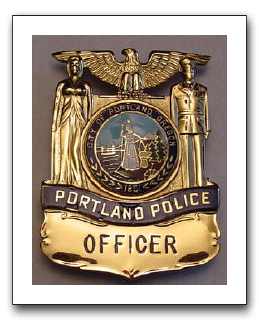Portland Withdraws Support from Terror Task Force
Mayor Potter, a former Portland police chief, earlier this year requested that the federal government grant him, the police chief and the city attorney top-secret security clearance — the same as task force officers — so that city leaders could have access to case files and more frequent updates. Potter said he wanted the ability to monitor investigative activities involving the city’s officers in order to make sure they obeyed state laws barring them from monitoring people solely because of their religious or political beliefs.
This case raises major issues of democracy. If the people of Portland have seen fit to elect Mr. Potter Mayor, what gives the FBI the right to say he can’t do his job, which includes overseeing his employees?
(“Portland, FBI Unit to Part Ways” in the LA Times, Via CSO Magazine “Security Feed.” Badge from the impressive police badges collection at http://namtiti.free.fr/. )

Richard Bennett has an interesting post at http://bennett.com/blog/index.php/archives/2005/04/29/portland-quits-anti-terrorism-task-force/
He claims that the mayor (a former police chief) wants to micromanage two of the officers on the joint task force.
So the issue you raise about democracy is interesting, should an official simply because he is elected be allowed to have access to information classified as ‘Top Secret’? The two qualifications seem to be separate domains.
Should a CEO be given access to all company records (such as your personal information) simply because he/she is a superior to other who have a legitimate business need for access?
I would prefer a separation of duties, a smart boss would insist upon NOT having access to the work material of subordinates.
Why, yes. The CEO should have access, as should the auditors. They shouldn’t be abusing their access, but in order to oversee things, they need access to them.